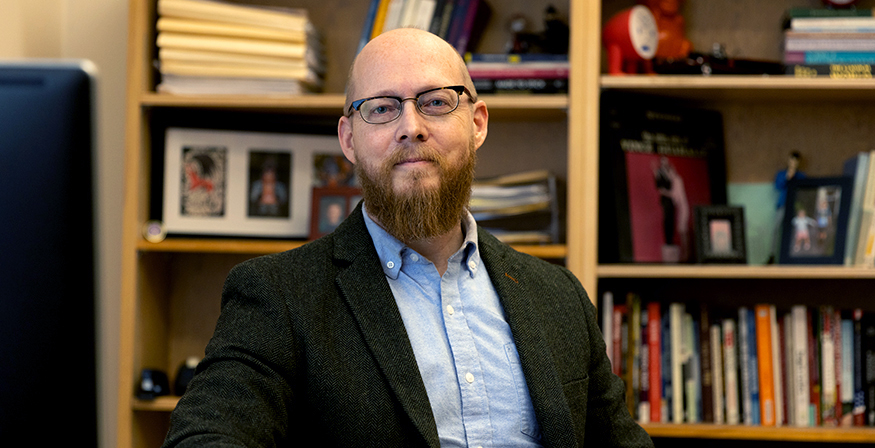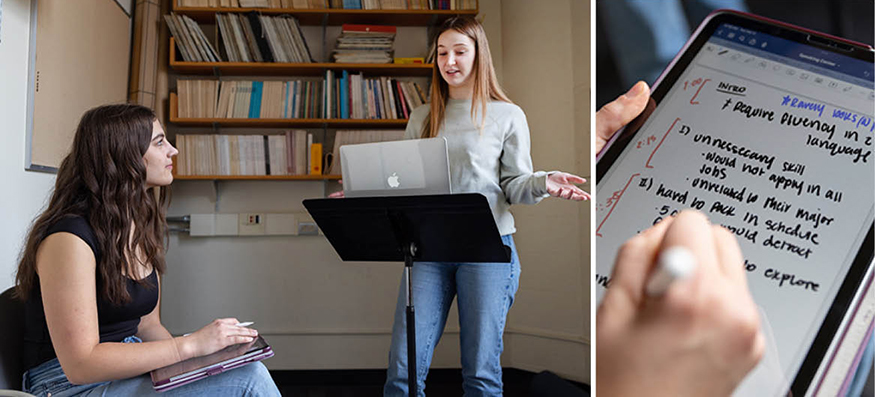
You’re about to give a presentation for a class or a job. As you head to the front of the room, you feel everyone’s eyes on you. Your heart races. Your hands turn clammy. You wonder why you agreed to this. When you open your mouth to speak, you pray your voice won’t tremble, betraying your nerves.
Sound familiar?
Public speaking is a common fear. Just the idea of presenting to a roomful of people can be anxiety inducing. But University of Washington Professor Matthew McGarrity and a team of student consultants offer guidance that can help.
McGarrity, teaching professor of communication, offers courses in public speaking (COM 220) and advanced public speaking (COM 320) and is director of the University’s Center for Speech & Debate, where students receive public speaking coaching from trained peers. The courses and Center are based in the Department of Communication in the UW College of Arts and Sciences.
“Everyone gets nervous about public speaking,” McGarrity says. “But with experience and helpful tools, they can learn to navigate that.”
Bringing the Audience Along
McGarrity seemed destined to teach public speaking. “I always had to have an audience,” he says, remembering his early years. He participated in speech and debate in high school and coached the competitive speech team at Indiana University while pursuing his doctorate. That led to a dissertation on the teaching of public speaking. He was finishing his dissertation when the UW Department of Communication was looking for someone to revamp its public speaking program. “It was a great fit,” McGarrity says.

In his classes, McGarrity aims to demystify the elements of a successful presentation. “I teach my students how, bit by bit, they can scale up this skill that everyone wants but very few people know how to obtain,” he says. An avid boxing fan, McGarrity sees similarities to training a boxer. “There’s a training system for being able to create someone who has the tools to react dynamically, to create what looks like an inborn gift,” he says.
Students often think that polishing their delivery — their voice, their body language — is the key to a successful presentation. But what’s actually most important, McGarrity says, is understanding the structural aspects of a speech.
“You’re writing for the ear rather than the eye,” he says. “The audience can’t reread what you just said. They can’t jump ahead. They don’t see a section break or a page number, so you have to build into the presentation all the hints and guideposts that make it easy to follow: a natural lead-in, some framing of what’s to come, and plenty of analogies they will understand. It doesn’t mean dumbing down. It means you’ll get to the details, but you need to bring the audience along with you.”
Coaching for Public Speakers
Like any other skill, structuring a speech effectively requires practice — and feedback. Students in McGarrity’s courses get some of that in discussion sections linked to the class, but McGarrity felt that individualized coaching would be a great help. That led him to create the Center for Speech and Debate in 2006.
The Center offers about 600 one-on-one consultations annually, each lasting 30 minutes. Any UW student can sign up for a session. In addition to students in McGarrity’s public speaking courses, the Center helps undergraduates working on class presentations or prepping for job interviews, and graduate students preparing to present their research. The Center’s consultants are undergraduates recruited from McGarrity’s public speaking courses.

“What I’m looking for in our consultants are students who have a good ear, can think systematically about speech, and give good feedback," says McGarrity. "The consultants are looking at speeches structurally, taking notes and seeing how the pieces work together.”
Thy Do, a junior majoring in real estate, was thrilled to be recruited as a consultant. “It felt good knowing that I made enough of an impact in class to be considered for this role,” she says. “Helping other students has made me more confident in myself.”
To prepare, Do and other consultants take “Speech Consulting,” a one-credit course in which McGarrity offers coaching strategies. They also begin consulting two hours each week. After completing the course, they consult for three hours each week.
The nerves have never gone away. But I’ve learned to embrace the nerves as a natural part of the process.
Senior Jamie Christiansen, a communication major and informatics minor, began consulting after taking both of McGarrity’s courses. “I was not ready to stop learning this new passion I had developed, but the UW did not offer any more public speaking classes,” she says. “I’ve been working in the Center for a year now. It’s one of my favorite parts of being a UW student.”

In addition to one-on-one consulting, Christiansen has co-led workshops about public speaking for UW groups. The Center offers one- and three-hour workshops to student clubs, classes, research teams, and other groups. (Some specialized workshops are led by graduate students.) The Center also organizes debate events and an annual speech contest. But the heart of the program is the consulting that supports students across campus.
The consultants believe they benefit as much as the students they help.
“Learning how to coach others and be a proficient speaker is something I will take with me for the rest of my life,” says consultant Ella Cuneo, a sophomore majoring in communication and psychology. Adds Christiansen, “Now I consider public speaking one of my more significant strengths. It’s not just about delivering information; it’s about connecting with the audience, conveying ideas effectively, and adapting to unexpected situations.”
Does that mean these consultants are relaxed before giving speeches? Not a chance.
“The nerves have never gone away,” Christiansen says. “But I’ve learned to embrace the nerves as a natural part of the process.”
Are you a UW student looking for feedback on an upcoming presentation? Schedule a consultation at the Center for Speech & Debate.
More Stories

AI in the Classroom? For Faculty, It's Complicated
Three College of Arts & Sciences professors discuss the impact of AI on their teaching and on student learning. The consensus? It’s complicated.

What Students Really Think about AI
Arts & Sciences weigh in on their own use of AI and what they see as the benefits and drawbacks of AI use in undergraduate education more broadly.

A Sports Obsession Inspires a Career
Thuc Nhi Nguyen got her start the UW Daily. Now she's a sports reporter for Los Angeles Times, writing about the Lakers and the Olympics.
